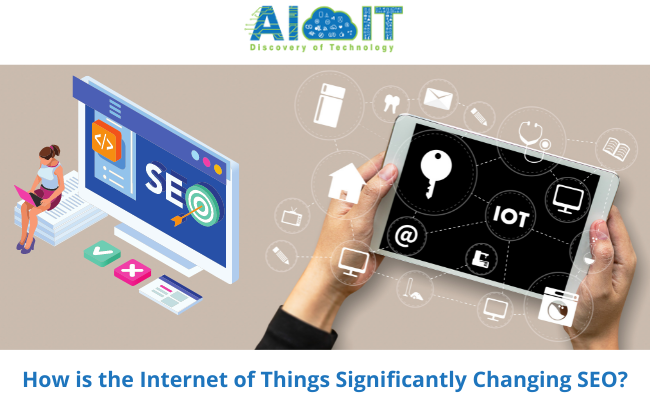IoT lets us do various things, but many people remain wary of it. This thinking is because of the doubt in the compatibility of this new technology. While the number of devices participating in the Internet of Things is growing, not everyone will have sensor lights or smart coffee machines at home, so the reach of IoT remains limited. There is also the possibility of a technological error.
Glitches are unavoidable in technology development. Many of our current SEO best practices will become less successful when wearable devices, voice assistants, and linked homes become common. We can notice the trends of IoT uses and how it changes users’ habits. Let us explore how SEO is changing with the advent of IoT devices:
Know more: Why blockchain based cloud computing could be the future of IoT?
How SEO is changing with the advent of IoT devices?
Giving priority to voice/conversational search
While keywords are crucial, conversational searches are becoming more popular. SEO experts should concentrate on likely conversational searches and adjust their site content accordingly.
For instance, voice searches will account for around half of all searches. Smart home gadgets such as Alexa now take voice instructions from consumers and respond directly. Without a doubt, the search algorithms that run these gadgets will prioritize information suited for voice output.
So experts need to examine the material they created deeply to determine the types of conversational queries that should lead to your website.
Now, you need to optimize your on-site content to be concise and cater to the direct question-answer pairs to help you rank well in voice search. You need to place these pairs at strategic locations across your primary content.
SERP formatting
The use of IoT devices like cars, smart home appliances, etc., has increased. But these devices do not look into SERPs. Similarly, people using Google maps and featured graphs do not use search engine results.
So, people optimizing specifically for SERPs should need to change their SEO strategy. Now, it will all depend upon the buyer persona and their devices.
Know more: Complete list of Technologies used in developing IoT Apps
For example, a mobile person will see search results, but a smart vacuum cleaner does not need to look into search rankings or your web fonts and colors. So, the businesses with buyers using IoT technology should have website designs that can adapt to these new mediums.
Focus on local SEO
Local SEO has become more crucial for the future with IoT technology. So, focusing on location-specific keyword optimization will be vital as Google Home and other technologies become more widely used.
If you are making a reservation at some restaurant through Google Home, you can expect not to travel far. This can only be accomplished if the nearby restaurant owner emphasizes site optimization.
Attracting the large audience
The use of IoT is continuously growing. You can take the help of IoT devices to attract more people and share your content with a larger audience. Another benefit is that you acquire more specific personal information about your leads.
As more devices participate in online searches and purchases, you’ll have access to more quantitative feedback about what your buyer is seeking from each device. SEO experts must learn how to analyze this data. Accordingly, they can personalize the content for each user and reach out to more individuals in increasingly diverse ways.
Prioritizing usability and mobile-friendliness
Mobile-friendliness and user-friendly web design will play a crucial role in the user flow optimization process, given the rising need for information whenever and wherever users need it.
Furthermore, the precise way the Internet of Things will impact the SEO sector will only be discovered when the new technology matures and becomes more integrated into our daily lives. However, business owners must be proactive to stay ahead of the competition.
Increased customization
One of the most popular keywords among marketers has been personalization throughout the previous decade. The shift away from mass marketing and toward more customization signaled the beginning of the demise of mass marketing.
Keywords that significantly reflect the demographic and lifestyle aspects of the target consumers are also not spared from this. If you run a company that sells designer children’s toys, your favorite keywords would most likely represent the concerns of a typical parent.
Read more: What Is Power BI? – History, Architecture, Uses
Nonetheless, the Internet of Things (IoT) promises to completely transform the degree to which you can personalize your SEO-driven marketing. You can collect data directly from consumers rather than conducting significant market research or using mediators to do so for you.
Wrapping Up:
It will be too early to predict the future of the Internet of Things in digital marketing. The IoT technology has still not gained the required momentum to observe its effect in marketing well.
But, SEO professionals can change their focus on personalization, bringing better user experience, increasing user engagement, formatting web design, changing SERP strategies, prioritizing usability and responsiveness, etc., as explained above. To stay competitive and follow the latest trends in SEO, you can also hire SEO Perth professionals.
Author Bio:
Ravi is CEO & Founder of Webomaze Pty Ltd. He believes in serving the industry with some unique solutions with a huge variety of services including web design & web development, SEO Services, eCommerce development, and so on.


